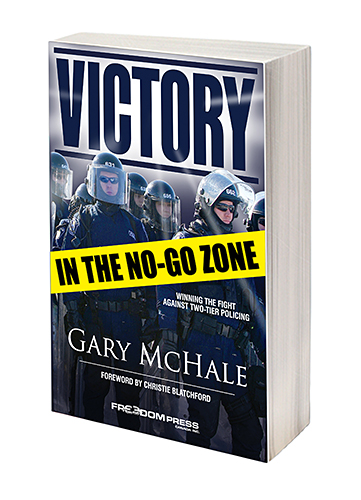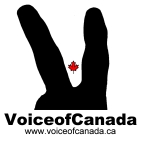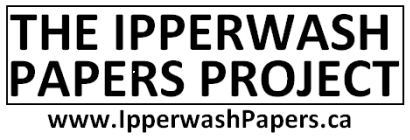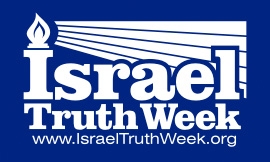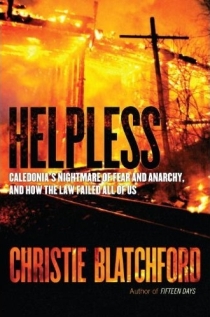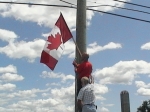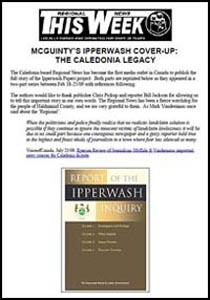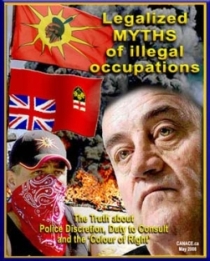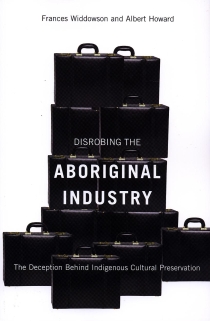“You may want to seriously consider a wrongful death suit, or whatever it would be called against the police and Fantino,” wrote James. “You know the complaint: Their reckless irresponsible media release destroyed my life. They should be held responsible for compensation. Also they should have to change their and all police department media ways so that others don’t get caught up in this crap.”
“On July 19, 2004, James drove to a country road, about 10 kilometres from his brother’s home in Newmarket, north of Toronto. He put a charcoal barbecue on the seat beside him and lit it. James died of carbon monoxide poisoning from the fumes.”
Earlier this morning VoiceofCanada editor/ConservativesAgainstFantino.ca co-founder Mark Vandermaas was tipped off to a tragic 2004 story about the suicide of an innocent man wrongly accused of being involved in a child porn by Julian Fantino and the Toronto police, both of whom were by blamed by James LeCraw in his suicide note for his ruined life.
He was directed by the source to a website called InjusticeBusters.com where we found LeCraw’s terrible story told via quotes from a Globe and Mail editorial and an 11-part CBC documentary produced by Kellie Hudson entitled, Weighing the Balance (also referred to as ‘Shamed and Named‘ in the link structure on the Thunder Bay CBC site where we located a copy of the award-winning series).
A commentary with additional links on Fantino’s startling record of creating victims follows these excerpts:
Globe & Mail editorial
Nov 29/04
The Dark Consequences of Naming and Shaming
[REPRINT]
EXCERPT: Mr. LeCraw and the other men were arrested as part of Operation Snowball, the Canadian portion of a major international investigation into persons using credit cards to acquire child pornography over the Internet. Toronto Police Chief Julian Fantino trumpeted the sweep at a press conference, using the occasion to call for more government funding and tougher laws to help stamp out the burgeoning illegal trade.
Chief Fantino was justified in using such an occasion to make an important point about a heinous crime. But he went further, using inflammatory language to describe the actions of the accused, all of whom were named and whose ages were provided. “They only have one thing in common,” he declared. “That is the criminal approach to their relationship with children.”
When the Crown subsequently withdrew all charges against Mr. LeCraw, there was no fanfare. In fact, there was not even a media release. By then, as CBC Radio revealed in a poignant documentary last week, Mr. LeCraw had become the victim. He lost his job as executive director of a non-profit agency that provides computers to schools and was unable to land another one. His friends shunned him and the once outgoing man became withdrawn. This past July, he killed himself, but not before leaving behind a letter accusing Chief Fantino of issuing an irresponsible public statement that ruined his life. He asked his family to seek the legal redress he himself could not afford.
CBC News
by Kellie Hudson, 2005
Weighing the Balance (Naming and Shaming)
[PDF, 14p]
The story of two men caught up in an investigation into the sexual exploitation of children on the internet raises troubling questions about whether or not authorities should publicly release the identities of those who are charged
“This series is based on the RTNDA Edward R. Murrow International award winning investigative radio documentary by Kellie Hudson.”
Weighing the Balance, part 1: Child porn, police and public safety
http://www.cbc.ca/thunderbay/features/naming/index.html
——————–
Weighing the Balance, part 2: Naming and Shaming>A Brother’s Tragic Tale
http://www.cbc.ca/thunderbay/features/naming/brother.html
[…] on April 16, 2003, Toronto police named James LeCraw as one of six men charged as a result of Operation Snowball, a Canada-wide investigation into child pornography on the internet. James was charged with using his credit card to download child pornography. After further investigation, the charges against him were eventually withdrawn, as they were against two other men named that day. A fourth man named was never even charged.
James’s family believes the charges against him were withdrawn because he was completely innocent. But for James it was too late. He never recovered from the stigma of being associated with child porn. In debt and depressed, 51-year-old James LeCraw killed himself on July 19, 2004. His family holds the police accountable for his suicide. They considered filing a lawsuit, but decided against it because of the cost to the family – both emotionally and financially.
——————–
Weighing the Balance, part 3: Naming and Shaming>A Brother’s Tragic Tale >Public Naming, Public Safety
http://www.cbc.ca/thunderbay/features/naming/public.html
 At the press conference where he announced the names of the six suspects, Chief Julian Fantino placed a sign in front of the podium. It read “It’s All About the Kids.” During the conference, he called for more government funding and tougher legislation, and then, with his words, he painted a picture of the accused men for the gathered throng of media. “These Project Snowball arrests involve offenders from all walks of life, who live in every corner of the city,” he says. “They only have one thing in common, and that is the criminal approach to their relationship with children. “It’s a perverse situation that obviously in many, many different ways, victimizes children.”
At the press conference where he announced the names of the six suspects, Chief Julian Fantino placed a sign in front of the podium. It read “It’s All About the Kids.” During the conference, he called for more government funding and tougher legislation, and then, with his words, he painted a picture of the accused men for the gathered throng of media. “These Project Snowball arrests involve offenders from all walks of life, who live in every corner of the city,” he says. “They only have one thing in common, and that is the criminal approach to their relationship with children. “It’s a perverse situation that obviously in many, many different ways, victimizes children.”
For Bob LeCraw, Fantino’s approach at the press conference amounted to “grandstanding.” “To use that kind of language in an organized press conference and name the people is… he’s tried and found them guilty before he even knows any facts at all,” says LeCraw. “I know the police do a lot of good work; this isn’t good work. They had nothing [and] they ruined more than my brother’s life – they ruined others.”
——————–
Weighing the Balance, part 4: Naming and Shaming>A Brother’s Tragic Tale >On Top of TheWorld
http://www.cbc.ca/thunderbay/features/naming/top.html
After his arrest and the publicity, however, James LeCraw went into freefall: The effects were immediate, and devastating. He was suspended with pay from his job, then, a few months later, let go with a severance package. People talked. Friends, some of them lifelong, disappeared.
Bob LeCraw says it was very hard on his younger brother. “For somebody that worked so hard to get to where he was going… it was just devastating,” he says. “He didn’t know what to do at first. He was just shattered.”
——————–
Weighing the Balance, part 5: Naming and Shaming>A Brother’s Tragic Tale >Waging War Against Child Porn http://www.cbc.ca/thunderbay/features/naming/war.html
On Sept. 23, 2003, about five months after James LeCraw was arrested, all charges against him were withdrawn. No reasons were read into the record during his brief court appearance, but a spokesperson from the Ontario Attorney General’s office said the prosecution was “discontinued on the basis of new evidentiary considerations” that affected the strength of the Crown’s case. So in the eyes of the law, James is innocent.
But there was no media conference to trumpet the news on that day – just a quick up-and-down appearance in a downtown courtroom. James called his brother to let him know the news. “It was fantastic,” remembers Bob LeCraw. “We got together a few days later, to have a beer, talk it over. He was still pretty upset. [But] now he was looking forward.”
James then set out to get his old job back, armed with a letter from his lawyer. “In criminal law, there is no greater exoneration than the withdrawal of a charge,” reads the letter, addressed to John May, chair of the board for Computers for Schools. “In fact, the withdrawal of a charge is an even greater vindication than an acquittal. [It] is tantamount to the charge never having been laid.”
But James’s former employer wouldn’t even consider taking him back unless he agreed to a separate investigation.
——————–
Weighing the Balance, part 6: Naming and Shaming>A Brother’s Tragic Tale >Charges Gone, So Are The Jobs
http://www.cbc.ca/thunderbay/features/naming/defiant.html
James LeCraw was defiant to the end, fighting to clear his name. About a month before he died, he gave a media interview in which he declared his innocence, and called for changes to police policy on naming suspects. His family knew James was suffering, but they had no idea how much. Christa LeCraw says she noticed the change in her uncle right away. “At family gatherings, he’d have everyone in stitches including my Nana, who’s trying to look all pretty for pictures, she’s got tears down face, laughing so hard,” says Christa.
But the last time Christa saw James was after his arrest, at a Mother’s Day lunch with the family. He seemed withdrawn. “He really didn’t have it in him,” she says. “I’d never seen him without life in his eyes like that.”
——————
Weighing the Balance, part 7: Naming and Shaming>A Brother’s Tragic Tale >Farewell to the family
http://www.cbc.ca/thunderbay/features/naming/farewell.html
It was obvious that James was angry and frustrated. He wrote an e-mail to his brothers after learning he wasn’t going to get his job back. “To be honest, I’m melting down with the inability to handle the anger, betrayal and frustration,” he wrote. “So I guess there is no real innocence, just unproven guilt. “
Two months after that Mother’s Day lunch, James wrote two more notes – one to tell his mom that he loved her and to reassure her that this had nothing to do with her. The second note, more detailed, was addressed to Gary and Bob, his older brothers.
“You may want to seriously consider a wrongful death suit, or whatever it would be called against the police and Fantino,” wrote James. “You know the complaint: Their reckless irresponsible media release destroyed my life. They should be held responsible for compensation. Also they should have to change their and all police department media ways so that others don’t get caught up in this crap.”
On July 19, 2004, James drove to a country road, about 10 kilometres from his brother’s home in Newmarket, north of Toronto. He put a charcoal barbecue on the seat beside him and lit it. James died of carbon monoxide poisoning from the fumes.
———————————-
Weighing the Balance, part 8: Naming and Shaming>Wake-up call for a sex addict
(not about James LeCraw)
http://www.cbc.ca/thunderbay/features/naming/addict.html
Weighing the Balance, part 9: Naming and Shaming>Wake-up call for a sex addict >A Secret Obsession
(not about James LeCraw)
http://www.cbc.ca/thunderbay/features/naming/obsession.html
Weighing the Balance, part 10: Naming and Shaming>Wake-up call for a sex addict >A Mother’s Nightmare
(not about James LeCraw)
http://www.cbc.ca/thunderbay/features/naming/nightmare.html
Weighing the Balance, part 11: Naming and Shaming>Wake-up call for a sex addict>A Life in Transition
(not about James LeCraw)
http://www.cbc.ca/thunderbay/features/naming/turnaround.html
COMMENT
Fantino’s lack of compassion for innocent victims of crime, and his callous disregard for the truth when in pursuit of an enemy are, frankly, so egregious that they can scarcely be believed. I offer two examples only here:
1. The comparisons with Fantino’s vicious public vendetta against Gary McHale are chilling. Be sure to see the references in this article:
2. Fantino’s refusal to restore policing to the people of the Sixth Line in Caledonia from when he was appointed in Oct 2006 until he left in 2010 (policing was finally restored in March 2010) may well have contibuted to the attempted suicide of resident Chris Dudych. Chris’s courageous, then14 year old daughter Pam ‘Dancer’ Dudych, spoke out about the plight of children on the Sixth Line in early 2007 via a school project entitled ‘Road of Hope‘ in which she talked about how she had to take medication and counselling because of the trauma of living without policing through a violent aboriginal uprising. You can read Pam and her family’s story here:
-
Caledonia Victims Project: Caledonia’s youngest hero: 14 year old Pam ‘Dancer’ Dudych
Christie Blatchford’s book, Helpless, tells the tragic stories of other psychologically-damaged residents on the Sixth Line, including Dieter and Maria Rauscher, which is recounted by the National Post in their 4th excerpt from her book:
-
HelplessByBlatchford, National Post Helpless excerpts: see excerpt #4 – ‘Christie Blatchford: “I’m a broken person, I’m just broken”
Unbelievable, while Julian Fantino has repeatedly met with the native thugs who terrorized Caledonia and assaulted his officers, in September of 2009 he turned down Mayor Trainer’s polite request that he meet with the victims of Sixth Line:
-
Dunnville Chronicle, Oct 21/09: Fantino says no
If voters in Vaughan want a candidate who believes in protecting victims and is tough on crime, Julian Fantino should be their last choice on the ballot.
References
- Globe & Mail editorial, Nov 29/04: The Dark Consequences of Naming and Shaming [REPRINT]
- CBC documentary, Kellie Hudson, 2005: Weighing the Balance (Naming and Shaming) [PDF, 14p]
- Conservatives Against Fantino: Why Conservatives Should Help Us Defeat Fantino – FAQs
-
HelplessByBlatchford, National Post Helpless excerpts: see excerpt #4 – ‘Christie Blatchford: “I’m a broken person, I’m just broken”
-
Dunnville Chronicle, Oct 21/09: Fantino says no
Mark Vandermaas, Editor
VoiceofCanada
info@voiceofcanada.ca

![James LeCraw- committed suicide July 19, 2004. Claimed in his suicide note that Julian Fantino's public statements falsely accusing him of involvement in child pornography ruined his life. [All photos from CBC source article; click image to view] James LeCraw- committed suicide July 19, 2004. Claimed in his suicide note that Julian Fantino's public statements falsely accusing him of involvement in child pornography ruined his life. [All photos from CBC source article; click image to view]](https://voiceofcanada.files.wordpress.com/2010/11/james-leccraw-suicide-july-19-04.jpg?w=150&h=123)
